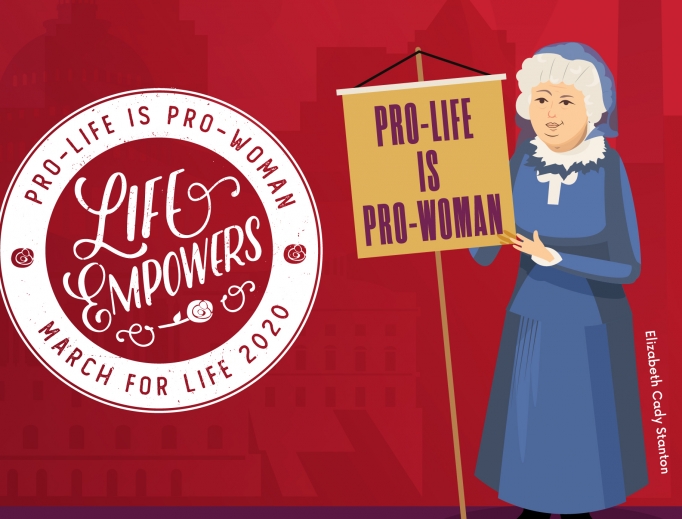‘Pro-Life Is Pro-Woman’: March for Life Aims to End Abortion, Take Back Feminist History
On the 100th anniversary of the 20th Amendment, the March for Life gives a clarion reminder to build a culture that recognizes that to be pro-life is to be pro-woman.

WASHINGTON — Claire Culwell understands what it means to be pro-life but not want to get involved in the struggle against abortion. Until 10 years ago, she saw that as always someone else’s responsibility.
And then she discovered she was an abortion survivor.
“I was always pro-life, but I never did anything about it until I learned my story,” Culwell told the Register. Culwell, who had been adopted by a devout Christian couple, learned the truth about her origins in a tearful reunion with her birth mother. At 13 years old, Culwell said, her mother was taken to have a surgical abortion, but the abortionist did not realize that Culwell’s mother was carrying twins. Culwell’s twin was killed, but she survived and was later placed for adoption.
“It really put a face with that unborn child and a name with that unborn child for me, and also for the post-abortive woman and for the woman contemplating an abortion like my birth mother,” she said.
Culwell is one of the featured speakers at the rally for the March for Life Jan. 24, which will commemorate the 47th anniversary of the infamous 1973 Roe v. Wade and Doe v. Bolton Supreme Court cases that legalized abortion and made it broadly available through all nine months of pregnancy.
“I want to share my story with people and just how this is important, why this is important, why we’ve got to go home into our communities and talk about this,” said Culwell, who will also be joined at the pre-march rally by Melissa Ohden, who survived a saline abortion.
March for Life organizers expect to draw more than 100,000 participants on the day of the march itself, with tens of thousands attending events surrounding the march. And the march’s theme — “Life Empowers: Pro-Life Is Pro-Woman” — recognizes the 100th anniversary of women earning the constitutional right to vote, and the event’s organizers are making the case to participants that the right to life and promotion of women’s dignity go hand in hand, seeking to reclaim the women’s suffrage movement’s pro-life roots.
“We’re very much going into the early suffragists and how they recognize the inherent dignity of women and the inherent dignity of the unborn and how they knew that being pro-woman wasn’t at odds with being pro-life,” Jeanne Mancini, executive director of the March for Life, told the Register. “And so that’s very much where the theme comes from.”

A conference, held the day before the March for Life at the Renaissance D.C. Downtown Hotel, features an impressive lineup of pro-life women in law, medicine, journalism and ministry. The keynote is Erika Bachiochi, author and legal scholar at the Ethics and Public Policy Center, and follows with a discussion involving Sue Ellen Browder, author of Sex and the Catholic Feminist and Subverted: How I Helped the Sexual Revolution Hijack the Women’s Movement, Dr. Christina Francis, chairwoman of the American Association of Pro-Life Obstetricians and Gynecologists (AAPLOG), Mary McClusky, assistant director for the U.S. bishops’ Project Rachel ministry development, and Brandi Swindell, founder and CEO of Stanton Healthcare.
The conference will end with a session designed to train activists in how to meet with members of Congress and state and local legislators.
The conference will be followed later that afternoon with the March for Life Youth Rally, which will feature pro-life voices such as Charlotte Pence, the vice president’s daughter, former Planned Parenthood director Abby Johnson, and Bryan Kemper, youth outreach director for Priests for Life, among those headlining the event.
Other strong pro-life women’s voices headlining the March for Life itself will be state Rep. Katrina Jackson from Louisiana, a pro-life Democrat who wrote the state’s Unsafe Abortion Protection Act that’s going before the Supreme Court in March. The keynote for the March for Life’s Rose Dinner will be Sister of Life Bethany Madonna, whom Mancini said “also very beautifully embodies that theme and is a great and really inspiring speaker.”
Other events complementing the March for Life include the “2020 Youth Rally and Mass for Life” Jan. 24 at the Capital One Arena. On Jan. 25, the Cardinal O’Connor Conference on Life will meet at Georgetown University, and the National Pro-Life Summit, co-sponsored by Students for Life of America, meets at the Marquette Marriott Hotel.
Mancini said the March for Life wants to help clear up in this 2020 election year “confusing messages about what it means to be pro-life and pro-woman” as well as “tell the truth about history.”
“We want people to know what it meant for these women to seek the right to vote and important rights and how they always saw the capacity for motherhood as being a beautiful, miraculous, positive thing, not as a liability per se,” Mancini said.
“Pro-woman really is pro-life,” she said. “Those two things go hand in glove and shouldn’t be put at odds with each other.”
Sue Ellen Browder, a Catholic author and former Cosmopolitan magazine writer who frequently contributes to the Register, agreed and told the Register that the pro-life movement is “taking back the f-word: feminism.” Browder said reclaiming the word “feminism” is important to show the mainstream media that “this belongs to us” and that there is a division between women over abortion that should not have occurred.
Browder pointed out that the original suffragists were strong Christian women who argued for women’s dignity. She said Alice Paul, a Quaker, spent time in a prison work camp due to her efforts. Browder said the National Organization for Women’s agenda was hijacked by pro-abortion forces in 1967. A third of its founders then resigned and carried on the fight for women’s equality in the workforce and academia with the Women’s Equality Action League (WEAL) before the organization dissolved in 1989. One of WEAL’s major achievements was the 1978 Pregnancy Discrimination Act, which prohibited employers from firing a woman for being pregnant.
“I was fired for being pregnant — being pregnant. People don’t realize that used to happen,” Browder said. “These conservative feminists who were pro-life are the ones who won all those things,” she said, adding that “a new pro-life feminism will make the workplace more family-friendly” and can help the #MeToo movement “fight that reduction of womanhood that the sexual revolution created.”
Brandi Swindell, CEO of Stanton Healthcare, has already been at work putting that pro-life feminism into action. She told the Register that Stanton has numerous clinics now “that reach out to women facing unexpected pregnancies with quality women’s health care, life-affirming solutions, wellness-care programs.”
“We encourage them and give them the tools they need to embrace motherhood, to embrace unexpected pregnancy and also embrace their dreams, their visions and their goals,” she said. “And guess what? We see them do it. They do beautifully.” Swindell said pregnant actress Michelle Williams’ speech Jan. 5 at the annual Golden Globes, saying she would not have succeeded without abortion, sends the wrong message to women. Swindell said that the pro-life movement needs to work to both change society’s hearts and make practical changes that build a “a community of life, a workplace of life, a college campus of life.”
“That means breaking it down into very tangible things,” she said. “So if a girl comes in at the age of 19, facing an unexpected pregnancy but doesn’t want to have to drop out of college, well, what are the things we can do to make sure she doesn’t have to drop out of college? There need to be college campus initiatives that provide child day care on campus for these women to be able to continue to go to school and have a safe place for their children to go.”
She said there are pro-woman changes in the workplace that can be made, too, such as “encouraging businesses to give more flex time to their employees” and giving mothers a “healthy amount of maternity leave.”
“Because all the studies show that when parents are able to parent and not be spread thin, they’re better employees, and they get more work done,” she said.
Mancini said the March for Life’s biggest impact is “how people who participate in it are really transformed by the experience, then want to do more at home.”
Claire Culwell said she hopes after attending the march people will feel transformed by “that experience and make a difference at home.”
“Whatever it is, I hope they do something to build a culture of life in their local community,” she said, “and really put their life toward that.”
Peter Jesserer Smith is a Register staff writer.
See also: 2020 March for Life Events and Activities for Catholics.

















